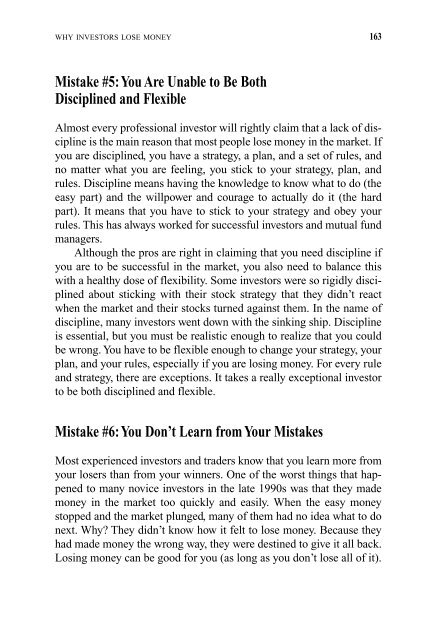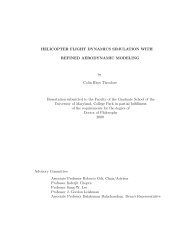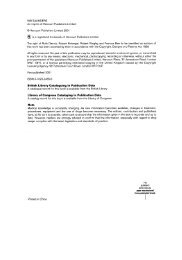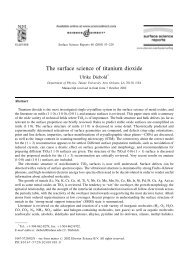Understanding Stocks
Understanding Stocks
Understanding Stocks
Create successful ePaper yourself
Turn your PDF publications into a flip-book with our unique Google optimized e-Paper software.
WHY INVESTORS LOSE MONEY 163<br />
Mistake #5:You Are Unable to Be Both<br />
Disciplined and Flexible<br />
Almost every professional investor will rightly claim that a lack of discipline<br />
is the main reason that most people lose money in the market. If<br />
you are disciplined, you have a strategy, a plan, and a set of rules, and<br />
no matter what you are feeling, you stick to your strategy, plan, and<br />
rules. Discipline means having the knowledge to know what to do (the<br />
easy part) and the willpower and courage to actually do it (the hard<br />
part). It means that you have to stick to your strategy and obey your<br />
rules. This has always worked for successful investors and mutual fund<br />
managers.<br />
Although the pros are right in claiming that you need discipline if<br />
you are to be successful in the market, you also need to balance this<br />
with a healthy dose of flexibility. Some investors were so rigidly disciplined<br />
about sticking with their stock strategy that they didn’t react<br />
when the market and their stocks turned against them. In the name of<br />
discipline, many investors went down with the sinking ship. Discipline<br />
is essential, but you must be realistic enough to realize that you could<br />
be wrong. You have to be flexible enough to change your strategy, your<br />
plan, and your rules, especially if you are losing money. For every rule<br />
and strategy, there are exceptions. It takes a really exceptional investor<br />
to be both disciplined and flexible.<br />
Mistake #6:You Don’t Learn from Your Mistakes<br />
Most experienced investors and traders know that you learn more from<br />
your losers than from your winners. One of the worst things that happened<br />
to many novice investors in the late 1990s was that they made<br />
money in the market too quickly and easily. When the easy money<br />
stopped and the market plunged, many of them had no idea what to do<br />
next. Why? They didn’t know how it felt to lose money. Because they<br />
had made money the wrong way, they were destined to give it all back.<br />
Losing money can be good for you (as long as you don’t lose all of it).

















